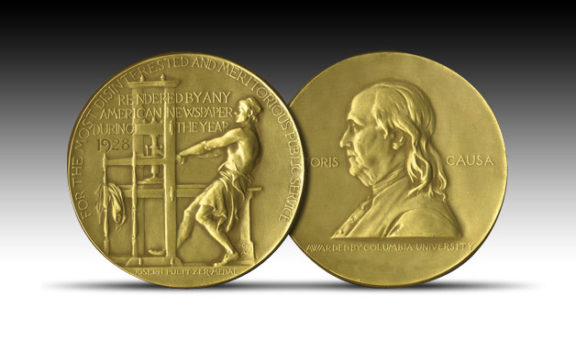
April 10, 2017; Boston Herald
It is becoming quite commonplace to see nonprofit news sites receive some of the highest honors as recipients of the Pulitzer Prize. Last year at this time, we reported that a collaborative story between the Marshall Project and ProPublica about a botched rape investigation had won. That was ProPublica’s third such accolade. (This year, it received a fourth—but back to that in a minute.) Nonprofits have also figured big as the subjects of winning entries this year.
Washington Post reporter David A. Fahrenthold, who was indefatigable in his reporting of Trump’s “charitable” activities, won the Pulitzer Prize for national reporting. Fahrenthold not only investigated the activities of the Donald J. Trump Foundation but also looked into Trump’s assertions regarding his charitable nature more generally. What he found was a great deal of bluster around the giving away of other people’s money but very little charity of his own, despite all of his claims to great wealth. Trump paid his own business fines from the foundation, bought a massive portrait of himself, and made what appears to be a campaign contribution to a Florida official who was in the position of decision-making on a suit being brought against Trump University.
Fahrenthold began to dog the then-candidate when Trump made a big show of raising $60 million for veterans organizations as his homegrown alternative to a preset debate. As it turned out, that money did not make it to those groups for many months, and then only after constant media attention. NPQ reported on the “eclectic and troubling” distribution of the funds to the veterans charities and the unusual experience of Liberty House as one of the recipients. Eventually, Trump paid a $2,500 excise tax to the IRS and reimbursed the Trump Foundation $25,000. New York Attorney General Eric Schneiderman still has the foundation under active investigation.
Sign up for our free newsletters
Subscribe to NPQ's newsletters to have our top stories delivered directly to your inbox.
By signing up, you agree to our privacy policy and terms of use, and to receive messages from NPQ and our partners.
The judges said Fahrenthold’s reporting “created a model for transparent journalism,” a model he built partly by using Twitter to publicize his efforts and let Trump see what he was doing. The president “can expect to see more of me on Twitter,” said Fahrenthold, now part of a team looking at Trump businesses.
The nonprofit investigative news site ProPublica also won a Pulitzer for public service for uncovering how an obscure law, originally designed in the 1970s to shut down prostitution in Times Square, was used to evict hundreds of mostly poor minorities. Finally, on the nonprofit-as-news-site side, the International Consortium of Investigative Journalists (ICIJ), McClatchy, and the Miami Herald won for explanatory reporting for their work on the Panama Papers. On the other hand, where nonprofits are the subject of investigation, the Salt Lake Tribune received the local reporting award for its coverage of Brigham Young University’s treatment of sexual abuse victims.
Is it heartening to see so many tax-exempt groups getting their share of scrutiny? Absolutely. The press is an important accountability mechanism for institutions, and we need it to be literate and attentive when examining us. You might also take note that there is not one executive salary scandal in these articles. Maybe it is time to move along.—Ruth McCambridge












